The effect of self-assessed fatigue and subjective cognitive impairment on work capacity: the case of multiple sclerosis1
Gisela Kobelt, Dawn Langdon and Linus Jönsson
Multiple Sclerosis Journal (2018) DOI: 10.1177/13524585187
Introduction
- MS is a highly disabling disease that has a substantial impact on work capacity,2,3 which is of particular relevance for economic assessment4
- Data from a large, international, cross-sectional study was used to investigate work impairment associated with the presence of fatigue and subjective cognitive impairment (SCI)2,3
- Despite the public debate about the role of production losses in decisions about public funding of treatments, few funders include them formally in their decision-making5,6
- The probability of being employed is lower in those with MS than for the general public; patients with MS commonly work shorter hours, take more sick leave, have poorer work performance and retire earlier2,3
- Disability, as measured by the EDSS, focuses predominantly on ambulation, and has been shown to be a strong predictor of workforce participation3
- However, EDSS does not capture common, prominent, non-physical MS symptoms such as fatigue and SCI, which may also play a role in the decision to reduce or abandon employment
Method
The European Cost of Illness study was a cross-sectional, observational study endorsed by the European Multiple Sclerosis Platform (ESMP). The study was approved by local ethics committees, and the data were collected with a standard questionnaire that people with MS could complete either online or on paper.1,2
Participants were requested to provide the following information:
Employed/Self-employed
- Number of weekly working hours
- Reasons for not working full-time
- Number of days sick leave over last 3 months
Not in employment
- Reasons for not working or having left the workforce
The impact of disease on work productivity was assessed with the Work Productivity and Activity Impairment (WPAI) questionnaire, using a self assessed visual analogue scale (VAS)*

The MS cost of illness study of more than 16,000 responses across 16 European countries concluded that the majority of working age people with MS are not working1
Novel insights on the impact of MS on employment
of working age respondents with MS were gainfully employed or self-employed
(n=13,796)
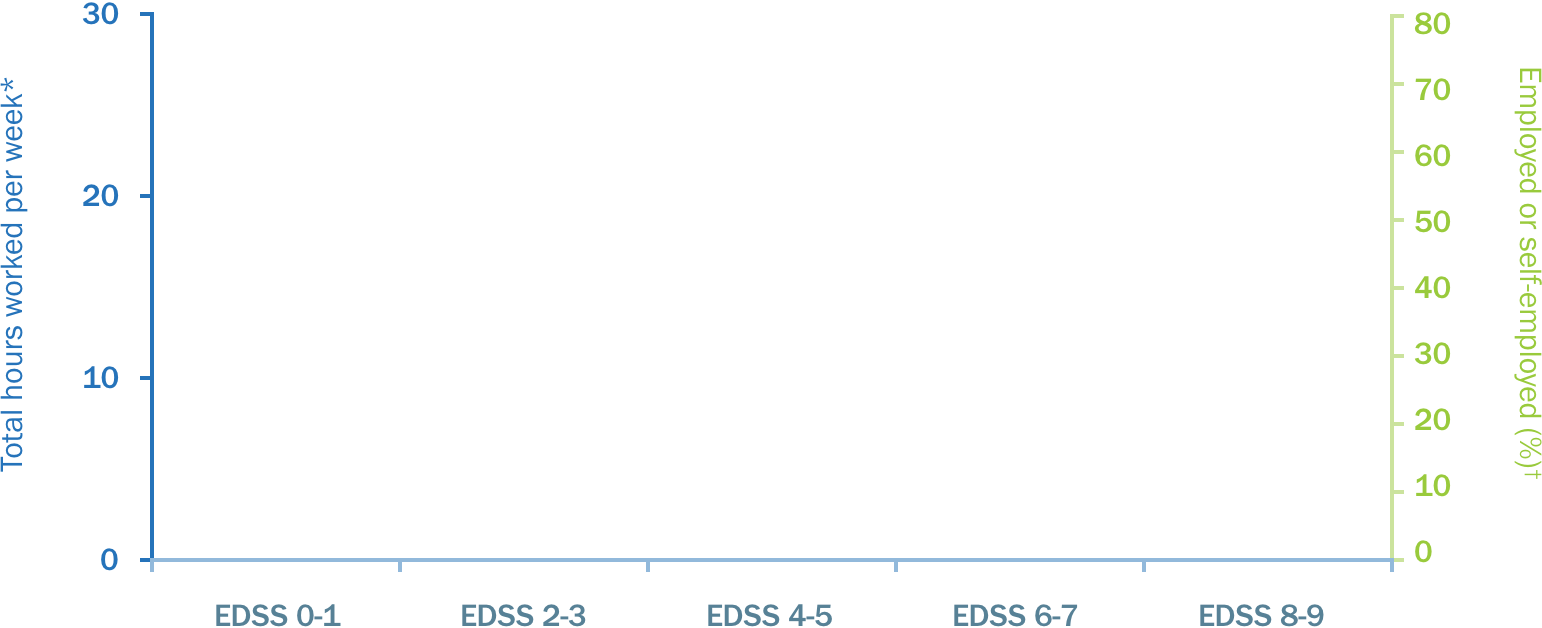

EDSS Scale
| EDSS 1: | No disability and minimal signs of MS in just one functional system |
| EDSS 2: | Minimal disability in one functional system |
| EDSS 3: | Moderate disability in one FS, or mild disability in three or four FS. No impairment to walking |
| EDSS 4: | Significant disability but self-sufficient and up and about some 12 hours a day. Able to walk without aid or rest for 500m |
| EDSS 5: | Disability severe enough to impair full daily activities and ability to work a full day without special provisions. Able to walk without aid or rest for 200m |
| EDSS 6: | Requires a walking aid – cane, crutch, etc. – to walk about 100m with or without resting |
| EDSS 7: | Unable to walk beyond approximately 5m even with aid. Essentially restricted to wheelchair; though wheels self in standard wheelchair and transfers alone. Up and about in wheelchair some 12 hours a day |
| EDSS 8: | Essentially restricted to bed or chair or pushed in wheelchair. May be out of bed itself much of the day. Retains many self-care functions. Generally has effective use of arms |
| EDSS 9: | Confined to bed. Can still communicate and eat |
In all patients working, the number of hours worked per week decreases as the severity of the disease increases
In the patients that were of working age, the percentage employed or self-employed decreases as the severity of the disease increases
Reduced workforce participation starts early in the disease course of MS1
Novel insights on the impact of MS on employment (n=16,207)
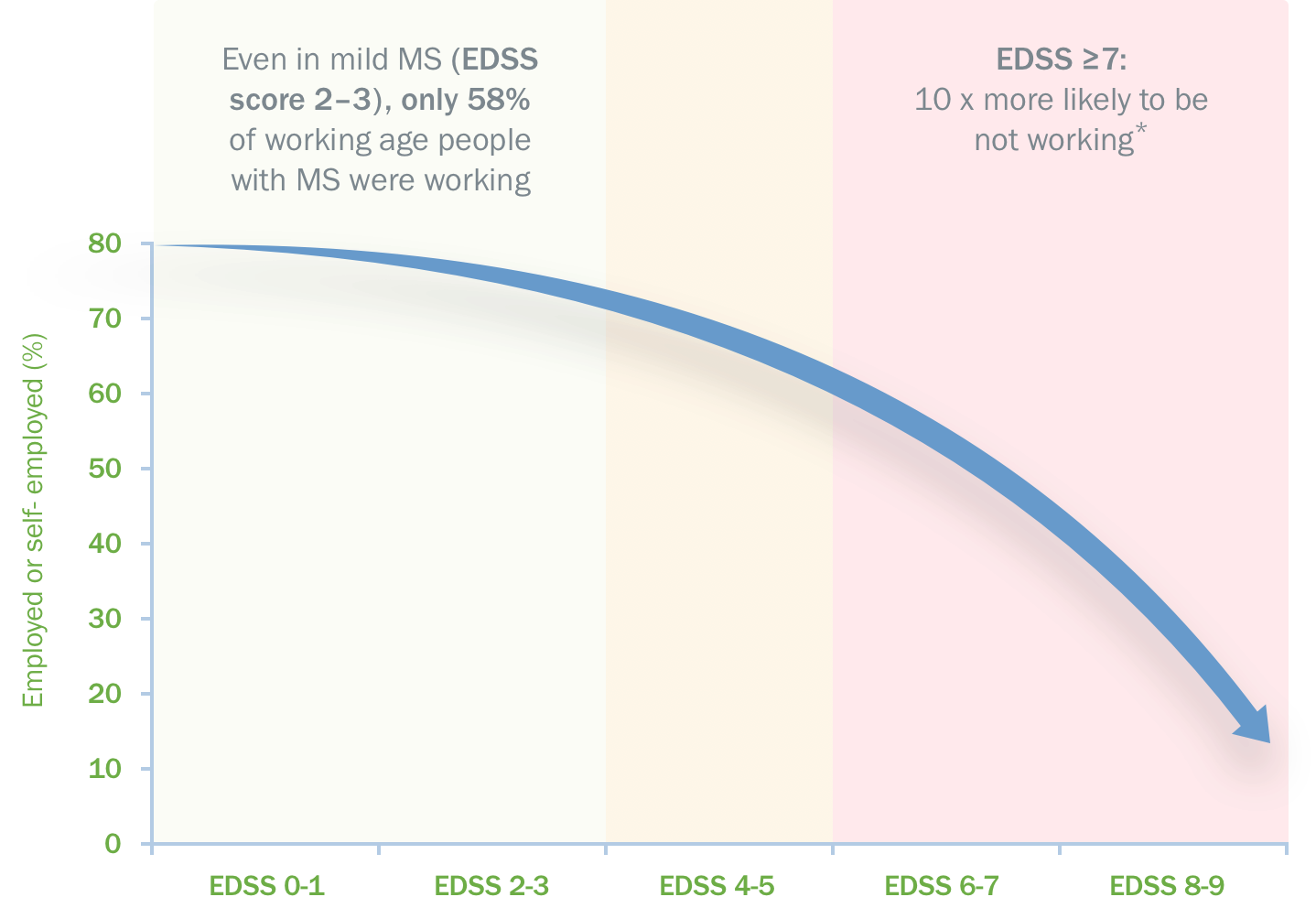
Patients with mild MS will range from having no disability and only minimal signs of MS in one functional system to having moderate disability in one functional system or mild disability in three or four functional systems. No walking impairment is experienced at this stage.
Patients with moderate MS have significant disability which may impair their full daily activities and their ability to work a full day without special provisions. Patients with moderate MS can typically walk between 500m to 200m without aid or rest.
Patients with severe MS are considerably more disabled, with MS hindering multiple areas of daily living. Patients with EDSS 6 to 7 will have limited walking capacity, requiring walking aids and only able to walk between 100m and 5m, with those at EDSS 7 essentially wheelchair bound but able to transfer themselves.
Those with MS at EDSS 8 to 9 are essentially restricted to a chair or a bed for much of or all of the day. patients may retain some self care functions but at EDSS 9 this will usually be lost.
- Mild MS
- Moderate MS
- Severe MS
*compared with no disability
Of the 58% of those not working,
reported that they were not employed due to their MS
The probability that a person with MS would be working was related to their geographic location, gender and levels of education1

men were
more likely to be employed or self-employed compared to females*
Those with higher educational levels were more likely to be working
Primary School
High School
Professional Diploma
Click on a circle above to learn more.
less likely to be working if only educated to Primary School Level…
less likely to be working if only educated to High School Level…
less likely to be working if only educated to Professional Diploma Level…
…compared with a University diploma
Among those working, fatigue and cognitive difficulties were the main reasons for reduced work productivity
of respondents reported fatigue as a reason for reduced work productivity 34%
of respondents reported cognitive difficulties as a reason for reduced work productivity
- Fatigue
- Cognitive difficulties
The negative impact on fatigue and cognition was evident, even in people with mild MS
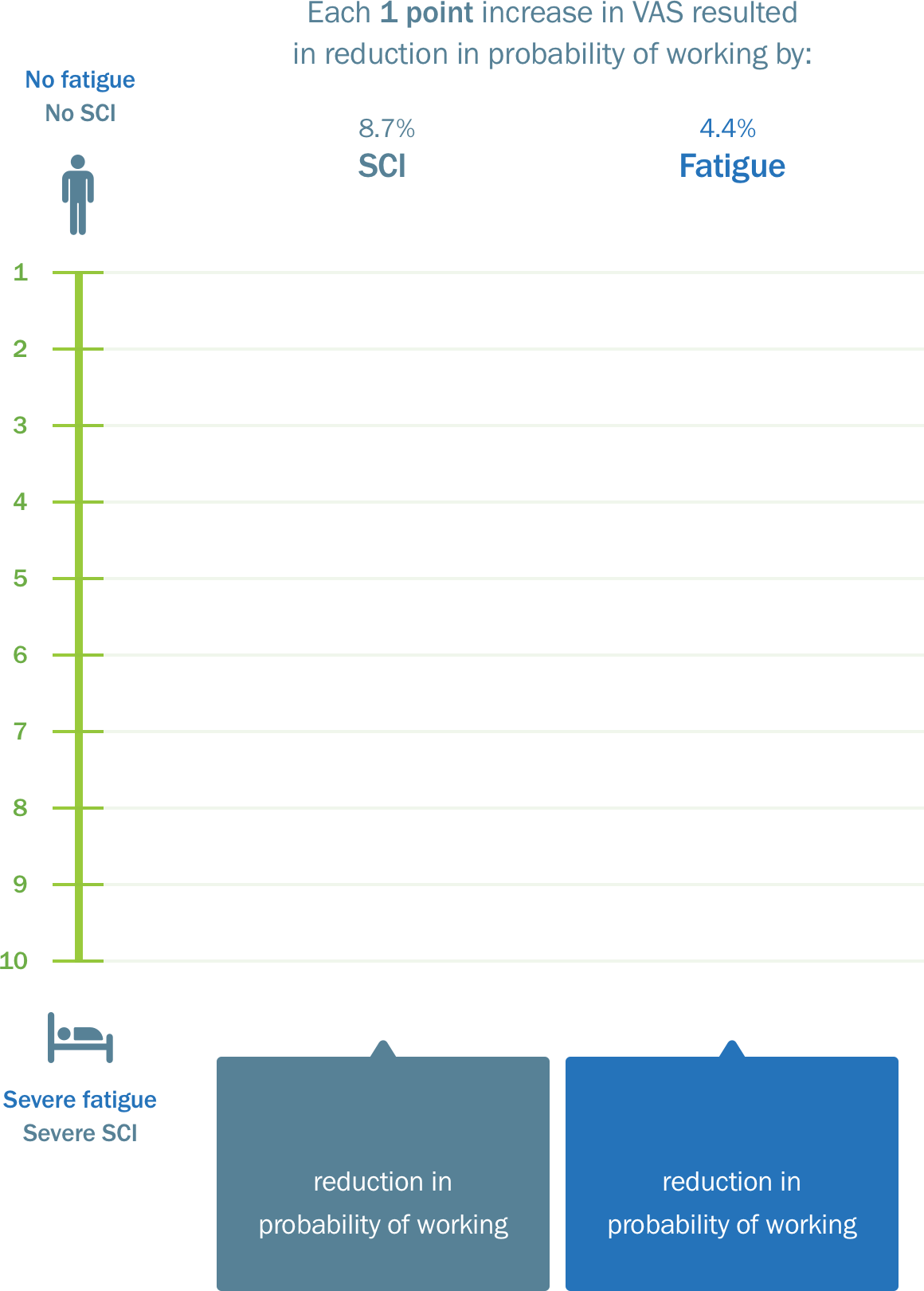
Increasing severity of fatigue and cognitive problems was directly related to the reduction in regular work hours among people with MS1
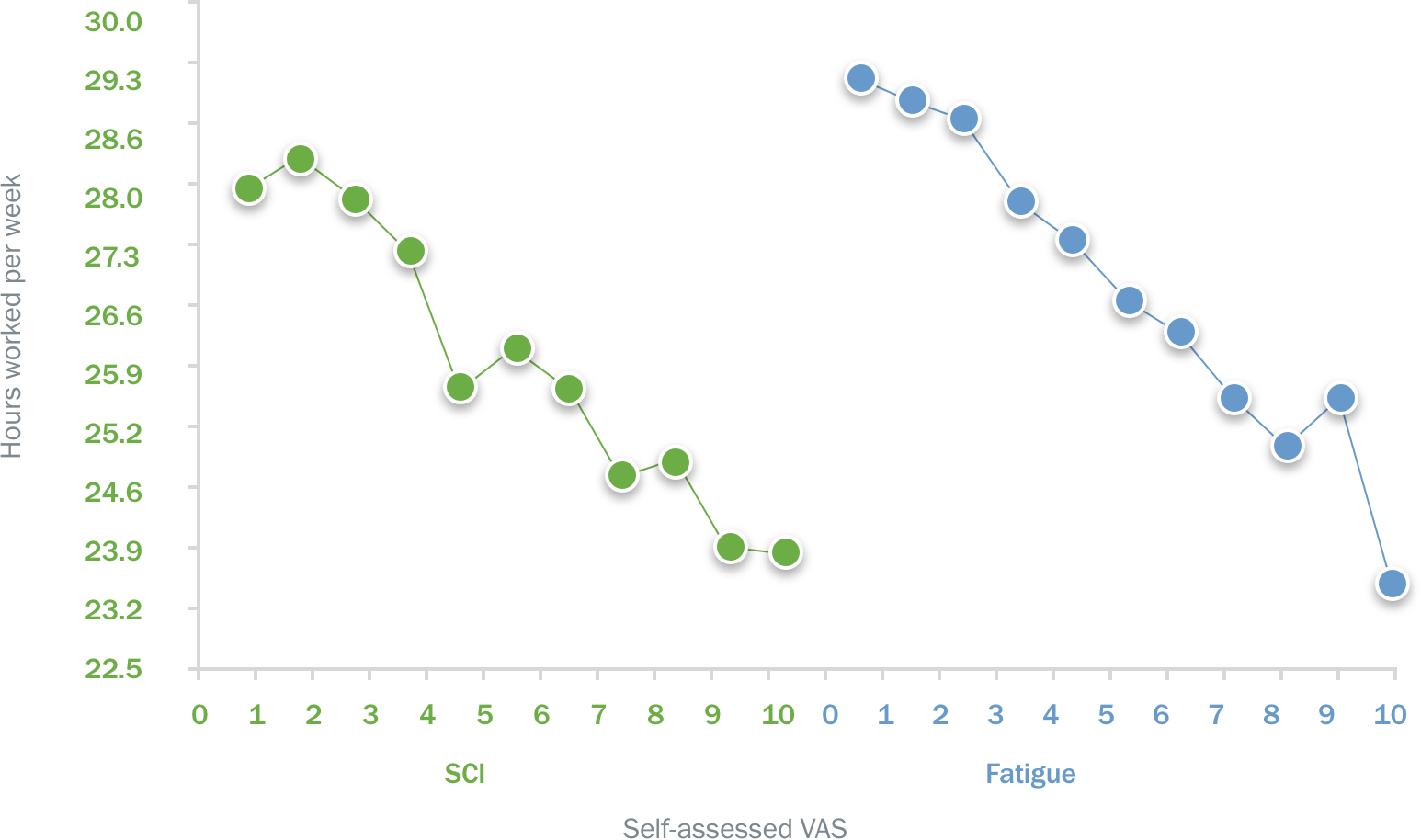
of those working and not on long term sick leave had been on sick leave in the past 3 months
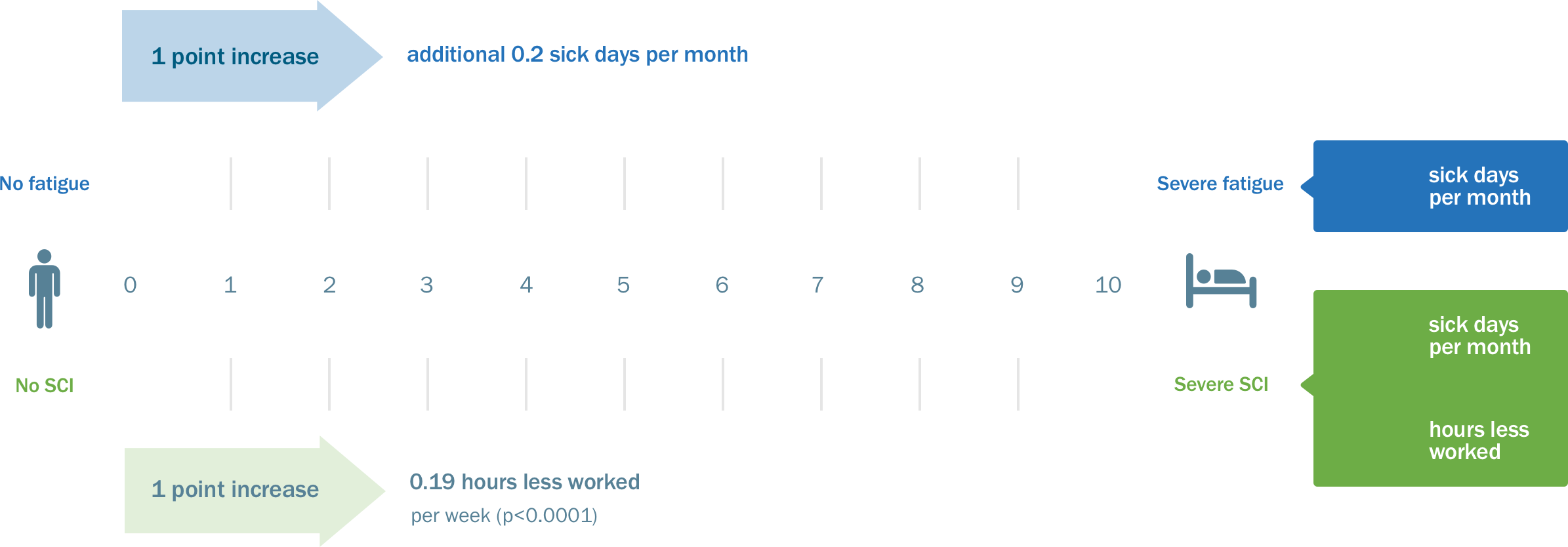
Biogen-XXXX Date of preparation: January 2019